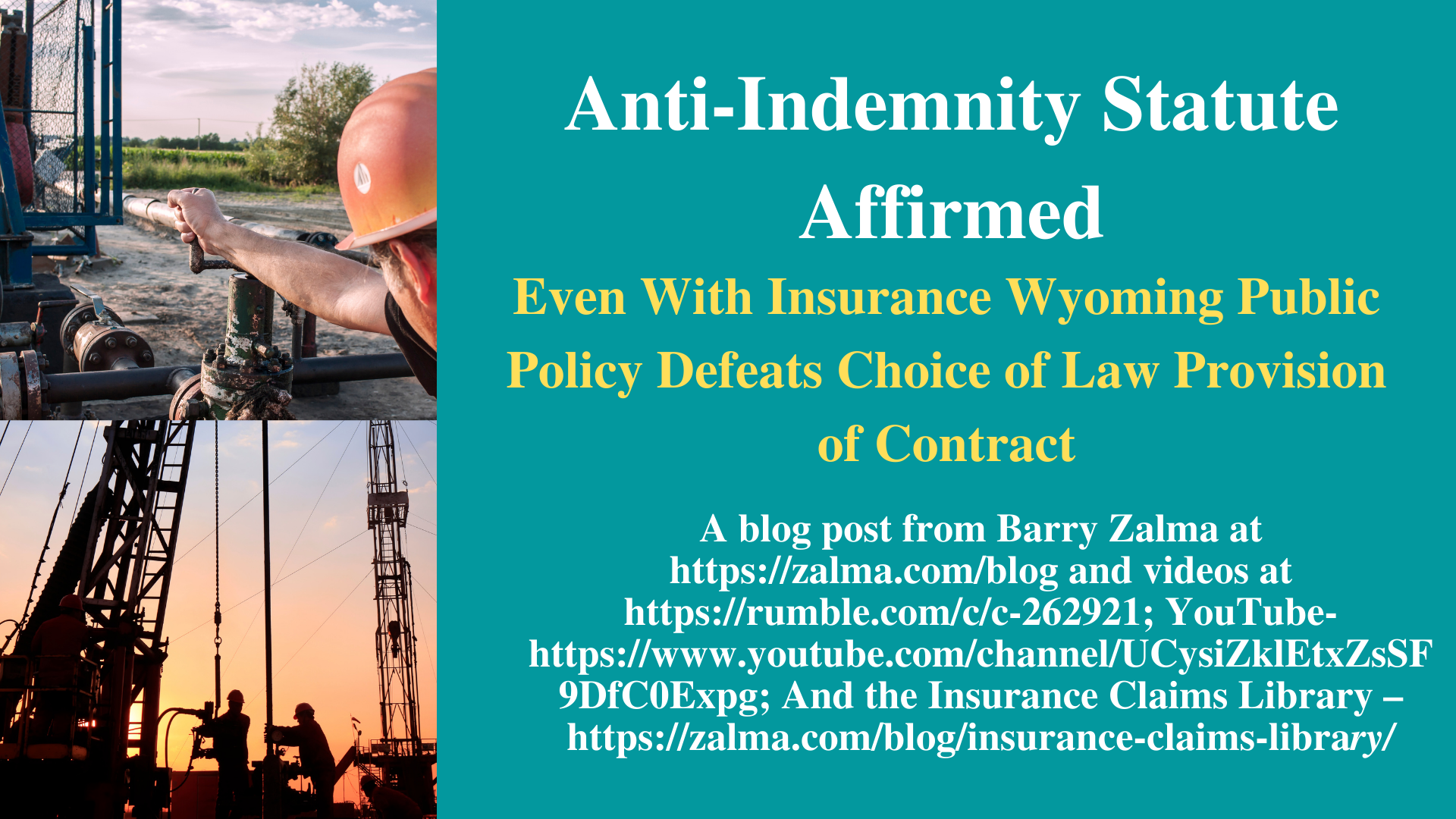-
News Feed
- EXPLORE
-
Pages
-
Groups
-
Events
-
Blogs
-
Marketplace
-
Offers
-
Jobs
-
Developers
Anti-Indemntiy Statute Applied

Even With Insurance Wyoming Public Policy Defeats Choice of Law Provision of Contract
Read the full article at https://www.linkedin.com/pulse/anti-indemnity-statute-affirmed-barry-zalma-esq-cfe and at https://zalma.com/blog plus more than 4000 posts.
Texas and Wyoming are leading oil-producing states. Like other leading energy states, they both regulate the use of indemnity agreements in their oilfields with Anti-Indemnity Acts. Wyoming, concerned that indemnification disincentivizes safety, forbids oilfield indemnity agreements. Texas, concerned that large oil companies will use their leverage to demand indemnity from independent operators, also disfavors the agreements. But it does not ban them entirely. To address the bargaining-power problem, it allows indemnification in limited situations including when the indemnity is mutual and backed by insurance. In Cannon Oil and Gas Well Services, Incorporated v. KLX Energy Services, L.L.C., No. 21-20115, United States Court of Appeals, Fifth Circuit (December 10, 2021) the Fifth Circuit was asked to enforce indemnity agreement in contract.
Wyoming & Texas Have Different Laws Concerning Oilfield Indemnity Laws
ANALYSIS
The Fifth Circuit, reading the Master Agreement recognized that even under applicable Texas law, indemnity provisions will not always be enforced.
To overcome the parties’ choice of Texas law, Wyoming must have a “more significant relationship” to Cannon and KLX’s indemnity agreement.
The place of performance favors Wyoming. The Supreme Court of Texas has not decided whether the relevant place of performance in indemnity cases is where the drilling or the suing takes place.
Parties generally expect that the law of the place of negotiation, contracting, and performance-none of which were Texas here-will govern. Even if the protection of justified expectations favors applying Texas law, those expectations can be overcome if they are substantially outweighed by the interests of the state with the invalidating rule.
The extent of the interest of a state in having its rule applied should be determined in the light of the purpose sought to be achieved by the rule.
To overcome the parties’ contrary choice of Texas law, KLX must next show that Wyoming’s interest in this indemnity matter is “materially greater” than Texas’s. It easily is. The anti-indemnity policy is a fundamental one.
The Fifth Circuit concluded, therefore, that Wyoming law applies. Its Oilfield Anti-Indemnity Act does not allow Cannon’s claim for indemnification.
ZALMA OPINION
Texas allows indemnity agreements if there is insurance available. Wyoming does not. Texas thinks its people would be protected by insurance. Wyoming stated a public policy in a statute and does not think the availability of insurance will protect its oil field workers. Since one was injured the public policy of Wyoming was applied and the attempt to choose Texas law failed.
© 2021 – Barry Zalma
We are 100% funded for October.
Thanks to everyone who helped out. 🥰
Xephula monthly operating expenses for 2024 - Server: $143/month - Backup Software: $6/month - Object Storage: $6/month - SMTP Service: $10/month - Stripe Processing Fees: ~$10/month - Total: $175/month
- Art
- Causes
- Crafts
- Crime
- Dance
- Drinks
- Film
- Finance
- Fitness
- Food
- Games
- Gardening
- Health
- Home
- Literature
- Music
- Networking
- Paranormal
- Other
- Politics
- History
- News
- Party
- Science
- Religion
- Shopping
- Sports
- SyFy
- Politically Incorrect
- Philosophy
- Theater
- Technology
- Wellness



